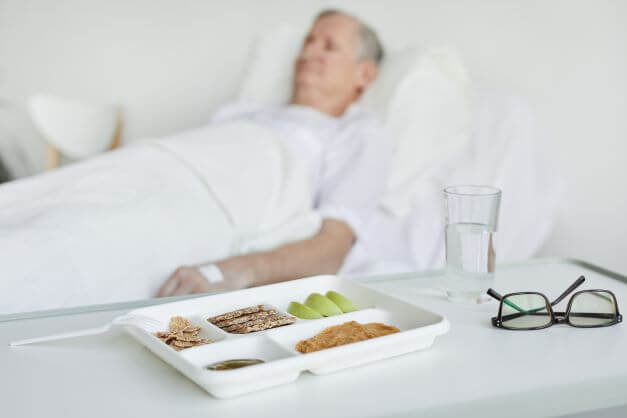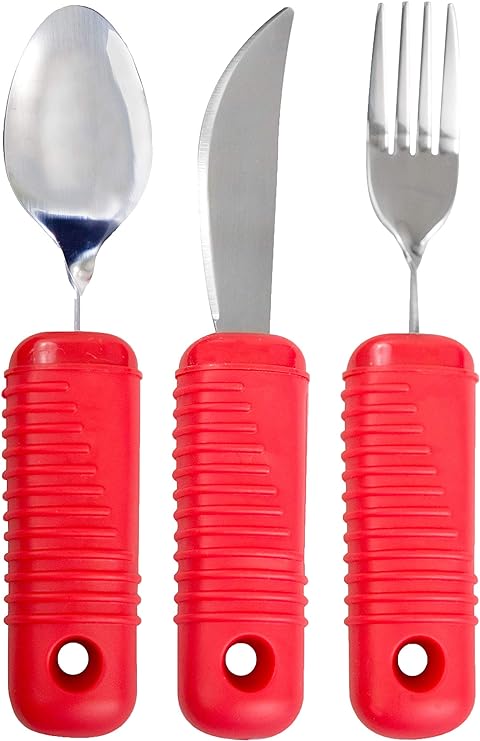The Importance of Dementia Nutrition
Let’s talk about the importance of nutrition for people with middle to late-stage dementia. It’s a crucial aspect of their care, as they can face many challenges with eating and drinking. So here are some things to keep in mind regarding their nutrition.
First of all, it’s essential to create a calm and relaxing mealtime environment. This means ensuring the space is comfortable, peaceful, and not too noisy or chaotic. People with dementia can be easily overwhelmed by sensory stimuli, so creating a soothing atmosphere can help them focus on their food. You can also try calming music or soft lighting to create a relaxing atmosphere.
Eating Concerns with Dementia Nutrition
Serving small, frequent meals can also be really helpful. People with dementia may struggle with larger meals and may not remember when they last ate. Smaller, more frequent meals throughout the day can help them maintain their energy levels and prevent them from getting too hungry or too full. Consider providing finger foods or easy-to-eat snacks, as this can make it easier for them to eat without assistance.
Offering familiar and favorite foods can also be really helpful. People with dementia may struggle with new or unfamiliar foods and may not recognize foods they used to enjoy. Offering foods, they are familiar with can help make mealtime more enjoyable and less stressful for them.
Hydration Concerns with Dementia nutrition

It’s also essential to make sure they’re getting enough hydration. People with dementia can sometimes forget to drink or may not recognize when they are thirsty. So ensuring they have plenty of fluids throughout the day can help prevent dehydration. You can also offer fluids in different forms, such as water, juice, or even soup or popsicles. See my Dehydration article for more information.
Hydration can become a problem that can lead to health issues. You will need to make sure they are getting enough to drink. The recommended amount is 8-10 glasses of fluids a day. Keep an eye on their urine output. They may get dehydrated if they do not go to the bathroom several times a day.
Another sign of dehydration is dark urine with a strong odor. (A strong foul odor can mean a urinary infection and should be checked by a doctor). A urine infection in older people can wreak havoc! They can have personality changes, quit eating, begin sleeping more, begin falling, or just appear sick. If something is just not right and you can’t put your finger on it have them checked for a urinary infection.

Vision Affects on Dementia Nutrition
As people age, it is common for their vision to decrease. For individuals living with dementia, this can be even more challenging. Dementia is a progressive disease that affects the brain and can cause a decline in cognitive function, including memory, language, and perception. As a caregiver for someone with dementia, it’s essential to understand how decreased vision can impact their eating habits.
Vision is critical when it comes to eating. It allows individuals to see their food, identify what is on their plate, and assess the portion sizes. However, as dementia progresses, the brain’s ability to process visual information declines. This can lead to several issues with eating, including difficulty recognizing food and determining the appropriate amount to eat.
One of the most common problems is difficulty distinguishing between different foods. Dementia patients may have trouble differentiating between the colors and textures of various foods, making it challenging to identify what they are eating. This can lead to confusion and may even cause them to refuse certain foods altogether.
Another issue is the inability to determine portion sizes. Without seeing the food properly, individuals with dementia may have difficulty estimating how much they need to eat. This can lead to overeating or undereating, negatively affecting their overall health.
Spillproof – Scoop Dish for Adults
Scoop plates with raised edges are designed to get the food from the plate to the utensil with one simple motion.
Caregivers can take several steps to help their loved ones with dementia maintain a healthy diet despite their vision challenges. One of the most effective strategies is to use contrasting colors when serving food.
For example, a red plate with colorful food can help the individual distinguish the plate from the table and between different items. Using utensils with high contrast with the food can also make it easier for the individual to see and eat their meals.
Another helpful strategy is to serve smaller portions on the plate. This can help the individual see and identify the food better and prevent overeating. Encouraging them to eat slowly and paying attention to their body’s signals is essential to prevent undereating.
Dementia Nutrition and supplements
In some cases, supplements may be necessary to help people with dementia get the necessary nutrients. Talk to their doctor or a registered dietitian to see if supplements might benefit them.
Another important aspect of nutrition for people with dementia is getting healthcare professionals involved in their care. Registered dietitians can provide personalized nutrition plans and monitor their nutritional status regularly. They can also help address specific nutritional deficiencies and ensure they get nutrients.
You should also be aware of any medication they take, as some medicines can negatively affect appetite and digestion. But, again, you may need to talk to their doctor about this and find alternative options if necessary.
It’s also important to avoid restrictive diets, as these can actually make things worse for people with dementia. Restrictive diets can lead to malnutrition and further cognitive decline, worsening the patient’s condition. Instead, aim to provide a balanced diet that meets their nutritional needs and preferences.

Feeding Tube?
As they move from the middle stage to the late stage, Dementia nutrition becomes a bigger issue. Getting them to eat will become harder and harder. Some people refuse to open their mouth and let anyone feed them. At some point, your physician may suggest a feeding tube. This is not a decision to make lightly.
If your family member is still in the early stage, please address this with them now! Most people do not want their life prolonged by a feeding tube. For many people, quality of life is more important than quantity. You must know your loved one’s wishes on this subject and respect their wishes when the time comes.
Shelter of Calm:
Your Guide Through Dementia's Storm!
Is Dementia's chaos stealing your peace?
We're here to restore the calm, empowering you to confidently face each challenge.
Take the first step towards transformation now.

Socializing and Activity
Lastly, getting them active and socializing can also help their eating habits. Physical activity can improve their appetite and digestion, while socialization can reduce stress and anxiety during mealtimes. Even simple activities like taking a short walk or sitting outside in the sun can help improve their overall well-being.
In conclusion, proper nutrition is essential for people with middle to late-stage dementia. By creating a calm and relaxing mealtime environment, serving small, frequent meals, offering familiar and favorite foods, providing hydration, using supplements if necessary, involving healthcare professionals, and avoiding restrictive diets, we can help people with dementia get the nutrition they need. By taking these steps, we can help them live a healthy and fulfilling life, even in the face of cognitive challenges.
Nutrition Facts & Alzheimer’s
Dr. Michael Greger 5 minute video talks about Alzheimer’s prevention and the relationship to diet.
Dr Neal Barnard
Power foods for the brain is a 17 minute TED talk and really worth your time to watch!
The Dementia Caregiver Blog Library
Activities, Advanced Directives, Agitation, Apathy, Approach, Apps for Caregivers, Basic Caregiving, Bathing, Bathroom Safety, Caregiver Burnout, Caregiver Compassion, Caregiver Emotions, Caregiver Help, Caregiver Loneliness, Caregiver Support, Cold & Flu Season, Communication Challenges, Dehydration, Dementia Complications, Dementia Doctors, Dementia Safety Home, Dementia Types, Dementia-Friendly, Dressing Issues, Driving Safety, Eating Problems, Fall Prevention, Family Help, Finances, Guns & Dementia, Harm Prevention, Healthcare, Help at Home, Hiding Dementia, Holidays, Hospice, Hospital Stay, In-Between Stage, Kitchen Safety, Laughter, Legal Healthcare, Marijuana use, Medication Tips, Music, Nutrition, Pain, Patience, Poop Problems, Relationships, Reminiscing, Routine, Safety, Sense of Purpose, Shadowing, Sleep Issues, Stages of Dementia, Sundowning, Television, Time Travel, Traveling, Toileting, Wandering
Exploring Caregiving Tools & Resources? Don't Forget to Check Out My Resource Page! 🌟

Hi, I’m Larea, a Certified Dementia Specialist and Registered Nurse with 30 years of hands-on experience helping dementia patients in various settings, from hospitals to nursing homes and hospice. Drawing on personal experiences with my family members and patients over the years, I’m here to help guide you on your caregiving journey.



